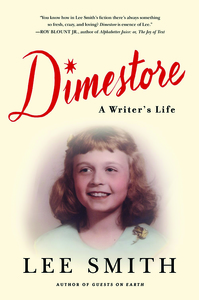

Lee Smith will be speaking at Sinking Spring Presbyterian Church in Abingdon on April 24.
Lee Smith's memoir, "Dimestore: A Writer's Life," published this month by Algonquin Books of Chapel Hill, is a collection of 14 essays which impressionistically connect the dots of her childhood in Grundy, Virginia, education, personal life and life as a writer. Smith's ability to magnify small moments of her life to find meaning in those, as well as in the larger moments, reminds readers of "Dimestore" why she is so successful at her craft.
As a well-beloved "native daughter," Smith's fictional subjects are largely Appalachian. Smith admits, however, in the preface to "Dimestore" that she was raised to leave Buchanan County. Her father, Ernest Smith, the owner of the local dime store, and a Buchanan County native with a slew of relatives, married Virginia Marshall, a home economics teacher from the Eastern Shore. Thus, the stage is set for the dichotomy of mountain culture and more "refined" sensibilities defining Smith's upbringing. This is not to say that Virginia Marshall Smith did not embrace her new home, friends and their different ways; she absolutely did. Knowledge of another world outside of the looming mountains was inherent in what Smith's mother passed on to her daughter. Lee illustrates this dichotomy in her preface:
"I was not to use double negatives; I was not to say "me and Martha.' I was not to trade my pimento cheese sandwiches at school for the lunch I really wanted: cornbread and buttermilk in a mason jar, brought by the kids from the hollers."
The dime store of the title closed in 1992 after her father determined it to be no longer a viable business. Grundy, plagued by floods until finally virtually destroyed by one in 1977, contributed to the store's demise. But, out of the ruins of the town, eventually rebuilt by the Army Corps of Engineers, the phoenix of Wal-Mart arose along with The Appalachian Colleges of Law and Pharmacy. The town was re-imagined and re-invented. Lee writes of the "before and after Grundy" in a voice that is both appreciative and wise. The re-imagined and re-invented town, along with the dime store/Wal-Mart imagery, serves as an extended metaphor for Smith's love of Grundy's imprint on her life alongside her need to encounter the ever-changing world. Smith describes a visit to Grundy after the new Wal-Mart is built over a parking garage: "Viewed from the top floor of Wal-Mart, the entire town looks like a toy town, like the train set Daddy always kept setup in the dime store basement toy section."
Just so, the 70-year-old Smith has achieved a perspective from which she can recount her memories with a nod toward nostalgia but more firmly rooted in honesty. Watershed moments in her writing life - attending a college lecture given by Eudora Welty, working with James Still and Lou Crabtree - document her literary evolution. Family members who are "kindly nervous," a son who struggled with mental illness, and a failed marriage are treated with clear-eyed description.
When Smith relates the transformation of a barbecue joint in Carrboro, North Carolina, near her current home into a sushi restaurant that she, of all things, owns, the sense is that Smith is writing about her own transformation and reinvention, both personal and professional. Grundy, dime stores, people - all fall subject to the past and inevitable change, but Smith makes sense of those memories and experiences by breathing life into them in her exquisite memoir.
Oster is a graduate of East Tennessee State University who taught high school English in Sullivan County. She recently retired from the School of Education at King University. She is a member of the A! Magazine for the Arts' committee.